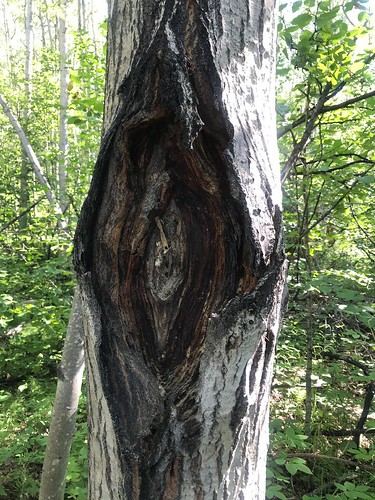Aspen Target Canker
Cytospora notastroma Kepley & F.B. Reeves
and other fungi
Host/s in Alaska: Aspen (Populus tremuloides)
Habitat: stems and branches
Current Status & Distribution (2023 Update)
Aspen target canker was not recorded during ground detection surveys in 2023. Last year, it was mapped on the Kenai Peninsula near Skilak Lake. In recent years, we have mapped aspen target canker across Alaska from the Kenai Peninsula to Chicken near the Canadian border, and north of the Yukon River (see Detection Map). In contrast to aspen running canker, these cankers are distinctly target-shaped with flaring bark. Although we have isolated the fungus Cytospora notastroma from these cankers, more work is needed to determine whether this is the main pathogen involved in aspen target canker in Alaska.
Symptoms, Biology & Impacts
Aspen target cankers are distinctly target-shaped with flaring bark. The concentric rings of the target are formed as the fungal infection inhibits wood production each year. One might estimate the age of the canker by counting the rings.
Target cankers progress very slowly, causing localized death of the cambium. In spring, the tree puts on wood and callus tissue growth to contain the fungus, followed by fungal growth through the new cambial tissue when the tree is dormant. Target cankers can cause tree death, but mortality usually requires several cankers to girdle the tree bole over time. Aspen target cankers appear similar to cankers caused by Ceratocystis fimbriata; however, signs of a causal fungus have not yet been found. Cankers can serve as entry points for stem decay fungi, making cankered tree bole susceptible to breakage.
Detection Map
Links and Resources
Aspen Decline. USFS. webpage
Introduction to Cankers and Overview of Aspen Cankers Diseases of the cambium and bark. USFS. 2011. Forest Health Protection Rocky Mountain Region webpage
For more information about aspen target canker in Alaska, contact Lori Winton, PhD, loretta.winton@usda.gov.
Contact us Forest Health Protection Homepage



